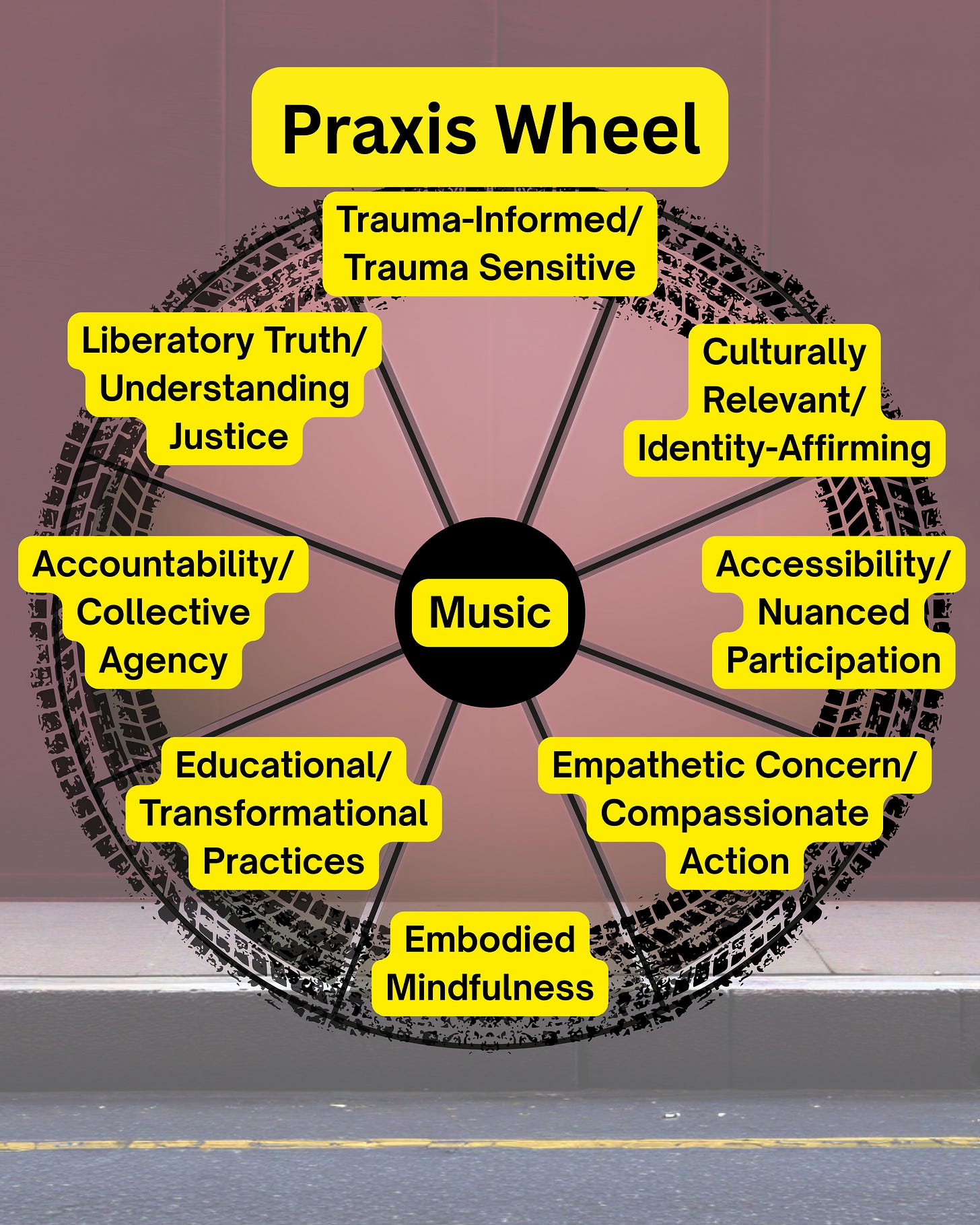The Praxis Wheel (Revised)
An Activist Framework for Safe, Liberatory Pathways in Creative, Healing, and Communal Spaces
For those unfamiliar with my work—
My name is Dorian Wallace, and I am a board-certified music therapist and composer deeply engaged in end-of-life care, carceral justice, and trauma recovery. This work has led me into spaces such as hospice care, prisons, and communities of survivors of systemic, cultic, and narcissistic abuse.
My guiding goal is to engage with care—responsively, intentionally, and through practices that support healing rather than impose it. Over time, I developed a framework to help navigate these complex spaces with integrity, transparency, and genuine respect. I now share this framework with other liberation-oriented, trauma-informed practitioners—mental health workers, artists, activists, organizers, facilitators, and all who engage in work that centers on healing and liberation.
The Praxis Wheel
The Praxis Wheel is a conceptual tool designed to serve as a compass for therapeutic and activist work in real-time. It offers guidance for ethical, responsive, and culturally grounded engagement in liberatory practice. This framework helps facilitators stay rooted in their purpose and direction while remaining flexible and adaptive to their communities' evolving needs.
Free Poster Download
A high-quality poster of the Praxis Wheel is available:
Color – redbubble.com/shop/ap/169829667
Black & White – redbubble.com/shop/ap/169830334
The Wheel and the Axis
At the center of the Praxis Wheel is your axis—your primary medium for engaging with the world. This could be:
Music
Art
Therapy
Education
Mutual Aid
Spiritual Companionship
Any embodied practice rooted in care
For me, that axis is almost always music. It has always been the foundation of how I relate to others and navigate through the world.
Whatever your axis, it serves as your center of progressive motion—your steady point of engagement with your community.
The Wheel is always in motion—adaptive, relational, and progressive by design. A few guiding principles:
No spoke is more important than another.
Each spoke supports and informs the others.
The structure is relational, not hierarchical.
Always begin with the first spoke: Trauma-Informed and Trauma-Sensitive.
The 8 Spokes
Trauma-Informed and Trauma-Sensitive
Trauma-Informed
Recognize the impact of trauma on the body and integrate that awareness to foster safety, trust, and grounding.
Trauma-Sensitive
Be flexible in your practice to create emotionally and somatically safe settings that are rooted in compassion and adjusted to community members' needs.
Culturally Relevant and Identity-Affirming
Culturally Relevant
Honor and hold sacred the lived experiences, practices, and values of your community members. Culture emerges from ancestry, community relations, shared identities, generational experiences, or spiritual traditions.
Identity-Affirming
Validate each person's unique identity. Stay open to differences and new perspectives. Prioritize support for marginalized voices and quieter dispositions.
Accessibility and Nuanced Participation
Accessibility
Be thoughtful in setting areas, tools, and interactions to ensure that everyone can participate comfortably, regardless of ability, experience, or circumstance. Create adjustments when needed.
Nuanced Participation
Honor diverse ways of engaging, allowing for flexible levels of involvement based on participant needs and capacities, and be mindful of friction.
Empathetic Concern and Compassionate Action
Empathetic Concern
Recognize, feel, and care about another person or community's lived experience without judgment.
Compassionate Action
Respond to suffering and injustice with deliberate and competent support, kindness, and solidarity to reduce harm and stimulate healing.
Embodied Mindfulness
Embodied Mindfulness
Be present. Be into your body's sensations, signals, and rhythms, and be insightful when you feel elevated. Be mindful of others' lived experiences and perceptions. Be grounded.
Educational and Transformational Practices
Educational Practices
Provide intentional activities that support learning, critical thinking, and the exchange of knowledge. These include awareness of mental health, trauma, and emotional resilience and examination of systems of power, oppression, and collective liberation.
Transformative Practices
Engage in practices that confront both internalized and structural oppression while nurturing equity, healing, and liberation. These may include somatic work, ancestral healing, communication practices, and other embodied or relational approaches.
Accountability and Collective Agency
Accountability
Center the practice of taking ownership of one's actions and their impact with a commitment to repair, growth, and integrity in relationships and communities.
Collective Agency
The shared power to shape decisions, take action, and co-create the future through mutual trust, collective voice, and cooperative effort.
Liberatory Truth, Understanding and Justice
Liberatory Truth
The pursuit of truth centers on the lived experiences of marginalized peoples, which dominant narratives have erased, distorted, or muted.
Understanding & Justice
The cultivation of in-depth awareness of structural harm alongside a commitment to healing, equity, and collective liberation.






